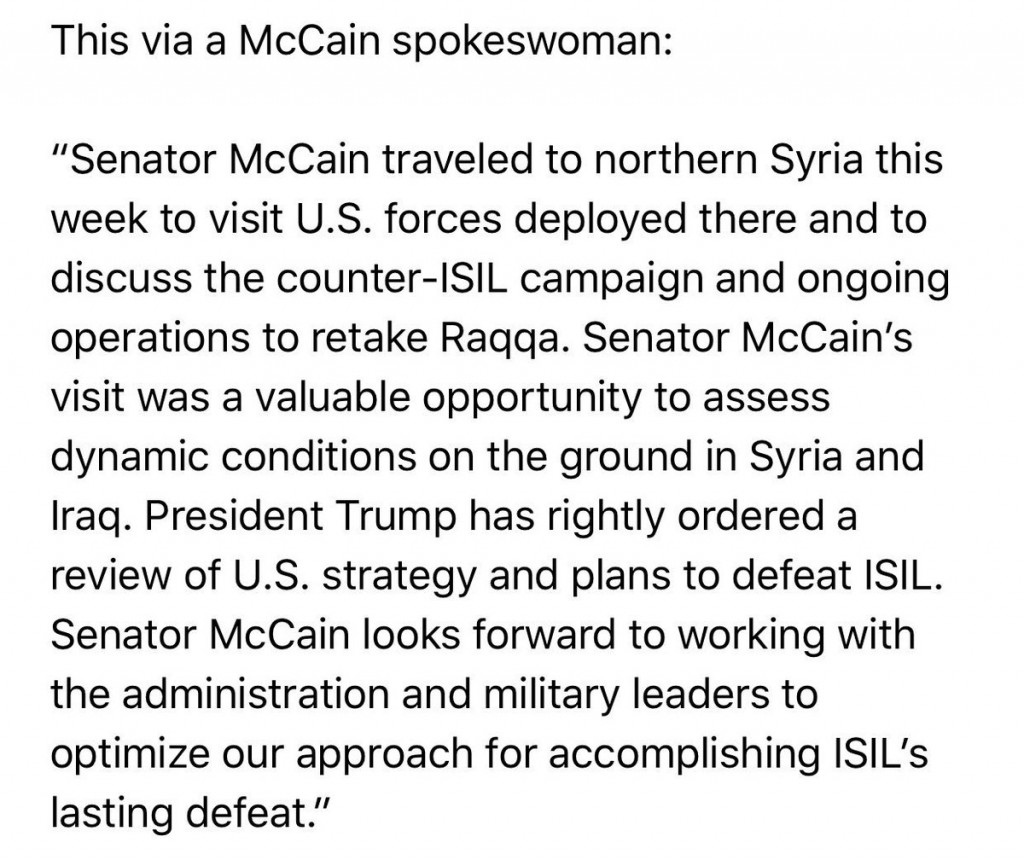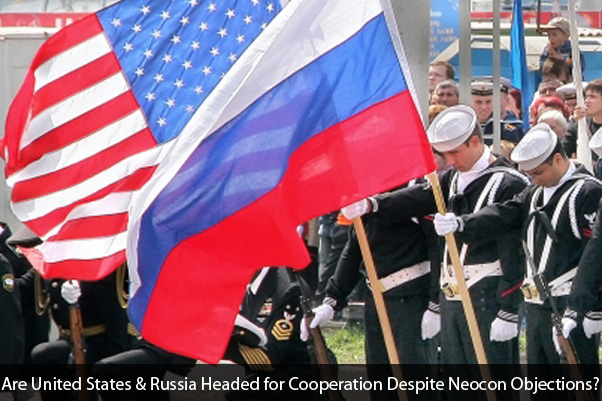DURING HIS PRESIDENTIAL CAMPAIGN Donald Trump gave many signs indicating a possible rapprochement with Russia in order to forward the war against terrorism. Since his election, political observers have been watching carefully to assess movements relative to this implicit commitment. As the data roles in, it is now possible to make some preliminary remarks based on actions taken by the new president during his first sixty days in office. Before doing so, it is helpful to review a New Era Forecast issued a month ago (February, 21).
FORECAST:
“The United States and Russia will continue down a path of rapprochement but not without significant interference, which can be expected from all ends of the political and social-cultural spectrum. Constant, well orchestrated, and confusing series of events can be expected as agents from both the left and right proceed to push confrontation with Russia to a boiling point. Nonetheless, in the long run, the shadow government will fail as it has consistently failed and been out maneuvered in its foreign policy initiatives for the past decade – we have no discernible reason to believe that this chain of events will cease unfolding. The shadow-government is being opposed by more than Mr. Trump.
l
The real question is what will Mr. Trump do? Will he continue down the road of his immediate predecessors, or be bold enough to set America on a new course?
Following that forecast, it was stated that if the new president continued with the foreign policy of the Bush and Obama administrations (as he appears to be doing), if he pursued the same path as his predecessors (a path favored by Neocon War Hawks and Liberal Globalists), American Foreign Policy would continue its downward slide and America would continue suffering one foreign policy embarrassment after another while earning the ire of other nations around the globe. President Obama was never able to disengage from war or to defeat ISIS; Trump however, has vowed to obliterate them, implicitly with Russian cooperation. It is this cooperation, above all else, that makes him an enemy of the Neocons (even though they are for the most part Republicans) and their Liberal allies deeply imbedded in ruling establishment.
The Trump Team is facing stiff opposition not only from an entrenched bureaucracy but from die hard members of the armed service committee and intelligence community who still view Russia through the lens of Soviet Communism or who are so committed to global liberalism that Russia (whom they realize is increasingly becoming a Christian nation-state, a purveyor of traditional family values, and an avowedly anti-liberal global power) must be stopped. Thus, if Trump plans to improve relations with Russia, he will be vehemently opposed by those who continue to insist upon the ideological export of liberal (economic and moral) American values, those who view themselves as patriots whose sacred duty is to confront the nefarious Russian Bear whose commitment to national sovereignty and Christianity is a threat to their global hegemony and the advancement of their Liberal Global Agenda.
l
l
Therefore, it was also stated,
“If Mr. Trump moves too quickly, he will not be able to withstand the tumultuous tsunami that is being gathered for a melancholy day of release; he must first cultivate relationships among international leaders (something he has done too little of) who have a very different view of America and American Foreign Policy than that being fed to him by Neocon war-hawks such as Sen. John McCain”, a man who keeps discrediting himself by accusing anyone opposed to his myopic interventionist military policy as “working for Vladimir Putin”, even if the others he assails are US Senators themselves.
l
l
Finally, it was also stated in February that
“It is not time for fisticuffs, so yes, Newera tends to believe that Mr. Trump has came out with a (foreign policy) rope a dope in Round One, at least partially so. If he is able to eventually pound ISIS into oblivion with Russian cooperation, he will build up a tidal wall of good-will and support composed of many international components that spell peace, a peace woven into a wall that will be able to withstand any Tsunami the Deep State can bellow in his direction.”
However, it was warned:
“If President Trump collapses before the bellowing winds and succumbs to the mounting global pressures of liberalism, if he fails to deliver on his campaign promises and follows the lead of Neocon war-hawks like Sen. John McCain, New Era foresees an abject failure on the horizon and the ultimate collapse of American Foreign Policy and the waning of American influence.”
Unfortunately, Mr. Trump appears to be following the foreign policy of the Neocon and Liberal establishment. Consequently, the honeymoon given him by foreign nations is coming to an end. They have waited to see if he would deliver on his promises to treat all nations fairly, to cooperate with Russia to defeat terrorism and to start a new page in American history battling liberalism and seeking an Era of Peace. Apparently, he will do none of these things and continue the foreign policy of his predecessor built on the back of American military might.
World leaders have been looking on and refraining from imminent action while holding things in suspension waiting to see what Trump would do. They are no longer waiting; instead, global trends are reverting back to where they were before Trump took office, the international movement against liberalism has recommenced. As forecast, the United States will either cooperate with this movement and be a purveyor of peace or it will suffer continued embarrassment. New Era holds to this forecast with the caveat that the United States might be pulled into the peace initiative in spite of its current bravado bolstered by an enormous military buildup. President Trump has not decreased but has already increased the military budget by $54 billion and is beefing up the American military presence around the globe to the ire of China, Russia, Turkey and many third world nations. The remainder of this article is concerned with US foreign policy in the Middle East and how it is alienating Turkey and leading to a surprise tete a tete between US and Russian forces NOW within a grenades distance of each other on the battlefield of North-Central Syria where THEY ARE BOTH BATTLING ISIS-ISIL-ISLAMIC STATE AT THE SAME TIME AND IN THE SAME PLACE. This unexpected rubbing of shoulders in Syria offers a glimmer of hope that might signify the beginning of an ongoing cooperation. Don’t hold your breath however, Sen. John Mccain happens to be in the mix:
McCain “made a secret trip to a Kurdish-held region in northern Syria last weekend to speak with US military officials, rebel fighters, and leaders in the region.”
On Wednesday, (March 23) Julie Tarallo, a McCain spokesperson confirmed the mission, with the following TWEET

What is Happening in Syria and How it Might Affect Relationships with Russia and Turkey
President Obama alienated Turkey with his ongoing support of the Kurdish People’s Protection Units (YPG), whom the Turks view as an ally of the Kurdistan Workers’ Party (PKK), which operates in Turkey and is designated by Ankara as a terrorist organization. President Trump is headed down the same road. Foreign Policy Magazine notices the trend. On March 21 they pointed out that warhawks and top US commanders regard the YPG as “the only viable option for ousting the Islamic State [Daesh].” If the YPG represents the only viable solution, clearly Washington has ruled out cooperation with Russia, the most obvious solution.
Following its own initiative, an initiative ostensibly calculated to Make America Look Great Again, the Pentagon is deploying 1,000 troops to assist the Syrian Defense Forces (SDF) to battle the Deash in Raqqa. The SDF, is a Kurdish dominated militia established in 2015 and sponsored by the United States to help establish a Kurdish enclave in Northern Syria. The SDF is composed primarily of Kurds fighting under their own banner of People’s Protection Units (YPG). More specifically, it might be said that the YPG is a Kurdish dominated militia, which is fighting alongside the American backed SDF who are opposed to radical Islamic terrorists and also to the Russian-backed Syrian government of Bashar al Assad. Currently the SDF is planning to engage in an all-out assault on Raqqa, the capital and stronghold of ISIS-ISIL or the Islamic State. According to The Foreign Policy Group (FP)
“Even as the Trump administration weighs its options, the U.S. military is ramping up for the assault, drawing up plans to deploy up to 1,000 more American soldiers to Syria in support of the YPG and allied forces, known collectively as the Syrian Democratic Forces (SDF), which have advanced mere miles from the city (of Raqqa). Pentagon officials assess that the roughly 27,000 Kurds in the 50,000-strong SDF are the more effective, experienced fighters.
The New York Times (March 15) corroborated this report by FP:
“The U.S. military has drawn up early plans that would deploy up to 1,000 more troops into northern Syria in the coming weeks, expanding the American presence in the country ahead of the offensive on the Islamic State’s de facto capital of Raqqa.”
l
“The deployment…would potentially double the number of U.S. forces in Syria and increase the potential for direct U.S. combat involvement in a conflict that has been characterized by confusion and competing priorities among disparate forces.”
The plan to deploy 1,000 more troops is meant to bolster a previous deployment of United States Marines already ordered by President Trump. On March 9, the Guardian reported on the deployment of several hundred US Marines to Syria:
“A few hundred marines with heavy artillery have been deployed to Syria in preparation for the fight to oust Islamic State from its self-declared headquarters of Raqqa, a senior US official said on Wednesday.”
l
“The marines moving into Syria are positioning howitzers to be ready to help local Syrian forces, said the official, who was not authorised to discuss the deployment publicly.
There are already approximately 500 U.S. Special Operations forces in Syria operating alongside the SDF. The are complemented by an additional 250 Army Rangers and 200 US Marines. The additional 1,000 U.S. troops will most likely be part of the 24th Marine Expeditionary Unit that are part of a
“… flotilla of ships loaded with 2,200 Marines that is now steaming toward the region – and the U.S. Army’s 82nd Airborne Division, of which 2,500 recently arrived in Kuwait.”
Regarding this deployment, Turkish Prime Minister, Binali Yildirim cautioned US leaders:
“If (Washington) insists on carrying on this operation with terror organizations (Kurds whom the Turks consider as terrorists and public enemy number one), our relations will be harmed — that is clear.”

Prime Minister Yilidrim’s statement is especially meaningful in the context of the Astana Meetings previously hosted by Russia, Iran and Turkey (in Astana, Kazakhstan), which have resulted in a military coalition consisting of Turkey, Russia, and Iran, already operating in Syria where they are acting as a peacekeeping force. Rather than joining the peace initiative, the US continues following its own foreign policy thereby driving Turkey further away from Washington. In fact, this latest US maneuver, might also compromise US relationships with the United Nations, which is beneficiary of Russian efforts at Astana: The Russian, Turks and Iranians provided the military backbone which brought the contending parties to the UN sponsored meeting of diplomats in Geneva (Feb 2017).
The cooperating powers all agreed to the territorial integrity and national sovereignty of the Syrian nation, implying that they will uphold the right of Syria as a sovereign nation, a nation entitled to determine for itself who its leaders will be and who will be invited to fight alongside it against common enemies.
“The delegations of the Islamic Republic of Iran, the Russian Federation and the Republic of Turkey, in line with the Joint Statement of their Foreign Ministers made in Moscow, on December 20, 2016 and the UN Security Council resolution 2336…”reaffirm their commitment to the sovereignty, independence, unity and territorial integrity of the Syrian Arab Republic as a multi-ethnic, multi-religious, non-sectarian and democratic state.”
Sergey Lavrov, Foreign Minister of Russia emphasized this point:
The talks in Astana are “an important contribution to… a comprehensive political settlement in Syria which will continue in wider activities in Geneva.”
The prospect of ongoing US support of Kurds, esp. in Northern Syria, is seen in Ankara as a threat to Turkish security, a threat seemingly ignore by Donald Trump, a threat that drives Turkey deeper into a meaningful coalition with Russia.
To make the scenario extremely interesting, Russia is also backing the Kurds also to the ire of Turkey who is simultaneously fighting side by side with Russia as agreed to by the Astana Accords. The whole complicated situation is growing ever more complex. Turkey has been assisting Syrian Government forces (Assad’ forces backed by Russia) as they move toward Manbij a city held by US backed Kurds; therefore the US has deployed troops there to oppose a Turkish offensive. As reported by the New York Times :
“In recent weeks, U.S. Army Rangers have been sent to the city of Manbij west of Raqqa (in NW Syria) to deter Russian, Turkish and Syrian opposition forces all operating in the area, while a Marine artillery battery recently deployed near Raqqa (70 miles SW) has already come under fire, according to a defense official with direct knowledge of their operations.”
It is interesting that Syrian forces supported by the Syrian government engaged in warfare with Islamic terrorists in their own country are referred to as “opposition forces“. Opposition to whom, to the United States? If the Russian-Turkish backed Syrian army is fighting ISIS (Islamic State) and is called the “opposition‘, who is the United States fighting?
Turkey finds itself in a quandary, it is assisting Russia who is supporting Syrian President Bashar al-Assad. At the same time, it is a NATO member and thus a US ally. The United States has been backing rebel forces against Assad and supposedly, at the same time, also fighting Islamic terrorists such as ISIS and Daesh whom the Russians and Turks are also fighting. Turkey has indicated that it would commit ground troops to help US backed forces topple Raqqa but that eventuality is contingent upon US relinquishing its support of the Kurds (YPG) whom the Russians are also supporting.
Moreover, as a result of the Russian brokered Astana Accords, Syrian rebels, that is those that are Syrian and not Islamic terrorists imported from throughout the Middle East, Syrian rebels who were opposed to Assad are now working with the Assad government to oust radical Islamic terrorists, which means if the terrorists are defeated there are virtually no indigenous forces of any considerable size left opposing the Syrian government; who will the United States support then? That is who will the United States support in Syria once ISIS or the Islamic State is defeated? Ostensibly, the Kurds will have the backing of both the United States and Russia, the preferred diplomatic position for both countries vis a vis Turkey. That is, it is better for the United States to have strained relations with Turkey over the Kurds if Russia also has strained relations with the Turks and for the same reason! Turkey will just have to get use to it – the US and Russia are apparently headed down a course leading to some type of cooperative agreement even if it is happening willy nilly.
The unexpected might be occurring, viz., Russia and the US are being pulled together by supporting the Kurds in Syria albeit at risk of exacerbating relations with Turkey. Sarah El Deeb is one of the few to recognize the unexpected. As reported in the Chicago Tribune:
“Ankara (that is, Turkey) has effectively unified Russia and the U.S. in the goal of limiting Turkish expansion in the north (North Syria where the Kurds live). Syrian experts say Ankara has lost influence to realize its aim of pushing the Kurdish forces back to the east of Manbij across the Euphrates. Moreover, Washington is pushing ahead with partnering with the Kurdish-led forces in the planned attack on Raqqa, despite Turkish opposition.”
According to Ragip Soylu a reporter for New Turkey, Turkey’s efforts to disrupt the US-Kurd alliance
“…has been tossed away as the Russian military and U.S. Special Forces moved last week in Syria’s Manbij to prevent Turkish-backed Syrian opposition forces from attacking the city,”
Russia has taken an unexpected stance on Manbij, instead of advancing on the city, THEY ARE WORKING TO PREVENT any further Syrian-Turkish advance deeply desired by the Turks. They are now involved in the mutual defeat of ISIS. At the moment they, the United States and Russia, are involved in planning an assault on ISIS in Raqqa and mutual support of the Kurds; the latter to the chagrin of the Turks
Complex as it is to discern, the future is perhaps beginning in Manbij and Raqqa, as U.S. Lt. Gen. Stephen Townsend, of the anti-ISIS coalition has said:
“All the forces acting in Syria have converged within hand-grenade range of one another. We encourage all forces to remain focused on the counter-ISIS fight and concentrate their efforts on defeating ISIS and not toward other objectives that may cause the coalition to divert energy and resources away from Raqqa.”
In other words, the US is not focused on toppling the Assad government (at least not now and possibly not again in the future). The mission is for once clear: defeat ISIS. This is something both the Americans and Russians can agree upon. The Russian are not looking for war between its allies, Turkey and Syria, versus the US forces in Manbij or Raqqa. Turkish and Syrian troops moving toward Manbij were halted due to a deal brokered by Russia that established a “buffer zone” between the Kurds and advancing Turk-Syrian forces. This zone is intended to protect the Kurds in Manbij and to keep Russian backed Syrian and Turkish troops out of conflict with the United States, esp. since they are all, as US General Townsend has stated: “within hand-grenade range of one another.”
Unfortunately, Turkey has not honored the zone:
“On Thursday, Syrian government media said Turkish shelling killed a number of its troops. Kurdish officials said Turkish advances continued even despite the buffer zone.”
Turkey, long a backer of terrorism throughout the Middle East, is now suffering a bout of what appears to be irremediable consternation. Since the United States and Russia are now face to face in Syria, since the United States and Russia are both supporting the Kurds in Syria, since the United States and Russia are both fighting ISIS in Syria simultaneously and at the same exact location, it will be difficult for Turkey to play anymore deceptive games designed to advance its own agenda and keep the two superpowers apart. The Turks however have at least three allies in this game, viz., the US Neocons, global liberals, and Israeli Zionists who will do anything to hinder real peace by keeping the two apart!
Nonetheless, will the United States begin to coordinate efforts with Russia to
(1) Protect Manbij, a city held by US backed Kurdish-led forces thereby increasing tensions with Turkey but lessening them with Russia (for the US that is)?
l
(2) Somehow pacify or restrain Turkey – something much easier if they cooperate – thereby bringing Turk dreams for a renewed Ottoman Empire or at least an Arab World under Turk domination to naught and as a result bring Turkey’s leaders to their senses?
l
(3) Defeat ISIS in a mutual effort to “bomb the shit out of them” as Trump promised during his campaign – Raqqa represents the possibility of fulfilling a campaign promise and of moving towards normalizing relations with Russia, although in a very unexpected way as explained above.
Or will the US act to salvage its relations with Turkey thereby lessening support for the Kurds and increasing tensions with Russia? Quite possibly Turkey will have to make a choice, that is, to seek a deeper alliance with the United States or Russia; either way, it will have to come to grips with the Kurds whom neither is likely to abandon. The only player in the region with more to lose than Turkey, is Israel (Saudi Arabia also stands to lose, but not as much as Israel) who has benefited from the enormous pounding its enemies have given to each other over these years – Israel benefits by continued conflict – it does not want peace between the US and Russia nor mutual-agreement over Syria and the Kurds. It remains to be seen what Israel will do in this situation; it has already violated Syrian airspace this past week.
“The Syrian military said the Israeli strikes had targeted a military installation near Palymyra (in Syria).”
l
“The incident was highly unusual in that it also saw the Israeli military break its customary silence over raids in Syria to release a statement to admit that its aircraft had been targeted while operating there.”
l
“Overnight, March 17, IAF aircrafts [sic] targeted several targets in Syria,” said the statement.”
The United States might not be fighting Syria at the moment but Israel is apparently trying to keep Syrian ally Iran from sending weapons to Hezbollah stationed on the Syrian side of the Golan Heights. Israel is not averse to violating international law to carry out its objectives, nor was Turkey who is now paying a price for its transgressions. Is Israel about to learn a similar lesson or will they influence the Trump administration to keep up war on Syria once ISIS is obliterated?
“Brig Gen Nitzan Nuriel, a former director of counter-terrorism in the Israeli prime minister’s bureau, said conflict with Hezbollah was inevitable as the group sought ever more advanced anti-aircraft missiles, heavy rockets and tactical weapons, but he believed Assad had seriously misread the situation.”
l
“Assad has not read the map correctly,” he said. “He believes it is only a question of weeks or months before he can declare a full victory and is looking to the next stage. I believe he is mistaken and that clashes in Syria will stay with us for the next three to six years.”
l
“Discussing Russia’s role in Syria, he added more controversially: “Russia got the messages it needs to receive from Israel.” That was, he said: “Israel will not allow anyone, including Russia to get in the way of implementing our military mission.”
Although Israel favors continued conflict, as long as its enemies are killing each other and as long as Syria is potentially neutralized along with its ally Iran, although Israel favors such things, New Era is forecasting eventual peace – if the US and Russia actually cooperate to defeat ISIS – which means something will have to give in Israel, perhaps something significant.







